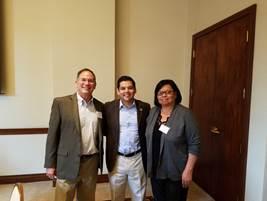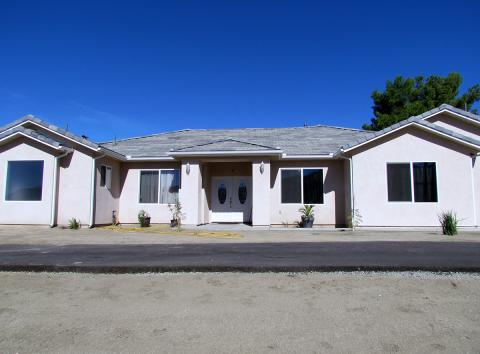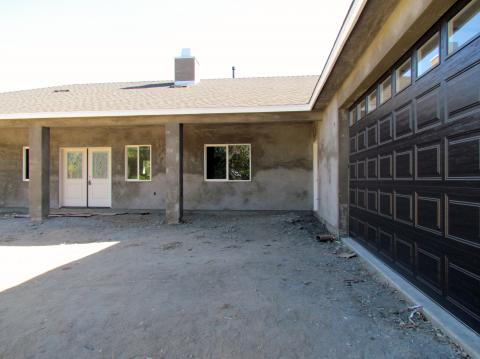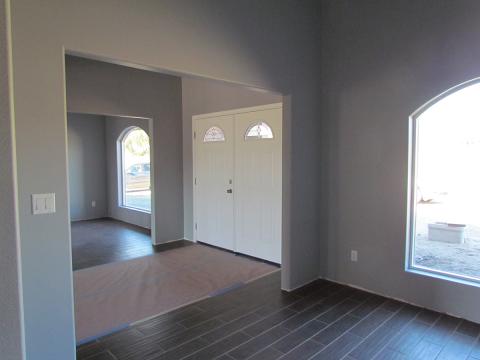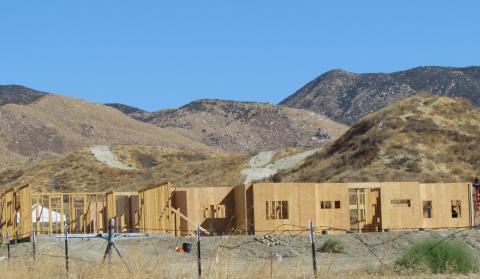Local tribes are helping members stay on the reservation ◆ By Mike Hiles
For the past three decades, Soboba tribal members qualified for low income housing programs to meet their housing needs through the All Mission Indian Housing Authority (AMIHA) program. However, because today's tribal members exceed the program's income criteria the tribe has invested in providing home loans for qualified applicants to build custom homes on their own reservation to stay close to family and friends.
Having multiple generations living near each other is a benefit to all, especially in the Native American communities where traditions and customs are passed down from the elders. At the Soboba Band of Luiseño Indians reservation near San Jacinto, Housing Manager Francie Diaz works closely with tribal members to get them into new homes near parents, grandparents and other family members.
"As Soboba Tribal Housing Manager, I am responsible for working hand in hand with our Tribal Credit Manager Carol Orozco, Tribal Administrator Michael Castello and administrative assistant Candace Vogel," Diaz said. "I do all the preliminary work such as preparing land applications for approval from Tribal Council, coordinating meetings with the applicants and contractors, working with Indian Health Service for septic and water systems, helping with Southern California Edison and SoCal Gas Company applications and making sure all the infrastructure is in place for the new homes."
Diaz is always available to meet with contractors, vendors or homeowners-to-be at the drop of a hat and said that is an advantage to living on the reservation while having this position. She is also working on a Native American Home Loan Program through the Veterans Administration which will provide loans to military veterans at Soboba for new construction and/or remodeling existing homes.
"I enjoy all aspects of working as our housing manager," she said. "Most rewarding is knowing that families are receiving beautiful, custom-built homes."
Currently, two homes have been completed and are occupied, two more will be completed mid-October and eight more have or will begin construction within the next two months.
"We have many tribal members returning to build their new homes at Soboba," Diaz said.
Ishwut Vega and his young family will be moving into their new four-bedroom, three-bathroom solar-powered house soon.
"This is a huge blessing and I'm very thankful," said Vega, 22.
His mother, Stacia Maciel, said having the younger generation make their homes on the reservation where they will raise their own children keeps them connected to their community and gives them more stability as well.
"It's a great blessing for the tribe to give this opportunity to our young people," she said. "The home loan helps them build their own credit as well."
As Chair of AMIHA's executive board for the past eight years, Diaz also sees the bigger picture. She has served on its board for about 25 years and as a commissioner she represents the tribal housing needs at Soboba and nine other tribes that belong to the organization.
AMIHA's ninth annual Strategic Planning & Housing Forum was held on Sept. 21 in Pala and Diaz welcomed all who attended. Executive Director Dave Shaffer said tribal leadership and staff from several Southern California Indian reservations participated in this year's program.
The morning's agenda featured speakers from the State of California regarding available housing and community development programs, a representative of the AMERIND Insurance Risk Organization, a representative of the Native American outreach for the 2020 census and the Director of Soboba's TANF Supportive Housing program. The keynote speaker was U.S. Congressman Raul Ruiz, who represents the 36th District.
"Congressman Ruiz's remarks were very well received by all in attendance," Shaffer said. "He shared his knowledge and concerns on a number of relevant topics in Indian Country, including housing needs, Indian health services, job training and workforce development and education."
Diaz said it was an honor to present Ruiz as the keynote speaker, who gave an inspirational presentation.
"He is not only a friend to the reservations within his district but also an advocate for the Native population nationwide," she said.
Certificates of Appreciation were presented to representatives of the Santa Ynez and Morongo tribes for their ongoing support of AMIHA's effort to provide low income Native housing. Collectively, these two tribes have generated nearly $7 million in housing development funds during the past seven years. AMIHA staff member Charmaine Devers received a plaque honoring her for 31 years of service to the organization.
A new feature of this year's event was including exhibitor space for housing development and related businesses. Fifteen businesses, including home builders, engineering firms, banks, artisans, and several other Native-owned businesses participated. The additional knowledge and information they provided enhanced the event.
The afternoon session was dedicated to updating the strategic plan at AMIHA, setting new goals and objectives and the day concluded with the monthly AMIHA Board meeting. Diaz said the major goal for the organization will be to continue to fund and provide safe and affordable housing for low-income families of non-gaming tribes within Riverside and San Diego counties.
"Soboba is most proud of our new home and remodel construction programs," Diaz said. "Growing up on the Soboba reservation was a hardship (for my family). Living conditions were very bad. We had a kitchen with no indoor plumbing and one bedroom shared by six kids, mom, dad and grandma. It is apparent that my passion is to help in any way possible to work towards safe and affordable housing for all Native families. I believe it starts here where one gains a sense of pride of their immediate environment and does not have to be ashamed of their living conditions. It is definitely a very personal and rewarding experience for me."
Information, www.amiha.org


